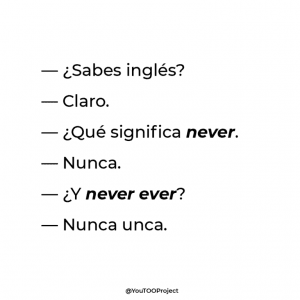Are you looking for a way to learn Spanish that is fun and engaging? If so, you will love these Spanish jokes! Not only are they funny, but they also help to improve your vocabulary and pronunciation.
So why not give them a try today? You may be surprised at how much you can learn from a few silly jokes!
What Makes Spanish Jokes So Funny?
Have you ever wondered what makes Spanish jokes so funny? Here are a few reasons:
- A lot of it has to do with the language itself. Spanish is a very expressive language, and puns and wordplay are common.
- There are also a lot of idiomatic expressions that don’t translate well into English. This can make Spanish jokes difficult to understand for non-native speakers, but that just adds to the fun!
- One more reason may be that many Spanish words are similar to English words, but with a slightly different meaning. For example, the Spanish word “embarazada” can mean either “embarrassed” or “pregnant.” This can lead to some confusion and usually a good laugh.
- Finally, Spanish jokes may be funnier than other types of jokes because they often play on cultural stereotypes. For example, there are many jokes about Spanish people being passionate or hot-tempered. While there may be some truth to these stereotypes, they can still be light-hearted and amusing.
Ultimately, what makes Spanish jokes so funny is that they can be both clever and relatable. Whether it’s a play on words or a humorous take on culture, there’s something for everyone to enjoy in a joke in Spanish.
So next time you hear a Spanish joke, don’t be afraid to laugh along – even if you don’t quite understand it. To understand things better, be sure to ask your Spanish teacher for advice. And check out these other benefits of taking Spanish lessons, too:
https://www.youtube.com/watch?v=yL0KC6r9vTY
Funny Jokes in Spanish – the Best Spanish Jokes Translated
Humor makes our lives better, but can it make your Spanish better as well? Today I’m here to show you how you can increase your vocabulary and heighten your cultural awareness through jokes in Spanish.
Understanding humor in our target language is a milestone in our learning process, and my favorite kind of humor to introduce students to is wordplay. I believe wordplay in any language is one of the most charming, creative ways we can express wittiness or silliness and it’s semantics at its finest.
So today, I have selected 7 jokes in Spanish that had me cracking up while doing research for this post, and now, my challenge will be to transmit to you what makes them so funny. I will probably fail, but if you learn something, I will consider it a win!
#1
— ¡Estás obsesionado con la comida!
— No sé a qué te refieres croquetamente.
This is a silly one. As you may already know, many adverbs in Spanish end in -mente. Such as concretamente, which translates to specifically in English.
In this joke, one person tells the other, “you’re obsessed with food”. The other person replies “no sé a qué te refieres” which is one way to say “I don’t know what you’re talking about”, except that they mistakenly say croqueta-mente. (croqueta = croquette). Thus, revealing their food obsession.
# 2
— ¿Qué le dice un techo a otro?
— Techo de menos.
This joke has a typical setup that begins with the question: ¿Qué le dice A a B? (What did A say to B?). But this joke appeals to what is known in linguistics as assimilation. The phrase “Te echo de menos” means I miss you. However, if said fast, “Te◡echo” will sound more like “Techo” which is also the Spanish word for roof or ceiling. So, what did a techo (roof) say to another? Techo de menos.
#3
— Buenos días. Busco trabajo.
— ¿Le interesa de jardinero?
— ¿Dejar dinero? ¡Si lo que busco es trabajo!
This joke also plays with assimilation. In the setup, someone is looking for a job. The other person replies “¿Le interesa de jardinero?”. This is an easy, shorter way to ask “Are you interested in a job as a gardener?”, except that when you say “de jardinero” (as gardener), it also sounds like the phrase “Dejar dinero” which means “To leave some money”. And so, the person gets offended: ¿Dejar dinero? (Leave money?) ¡Si lo que busco es trabajo! (Don’t you see I’m looking for a job?).
#4
— Mamá, en el cole me llaman despistado.
— Niño, que esta no es tu casa.
This is a classic mom-child interaction kind of joke. Here, a kid tells his mom “en el cole (which is short for colegio = school) me llaman despistado”. The verb llamar means to call, in this case, it means more precisely to call someone nicknames. The kids in school are calling him despistado, which in English means clueless, someone who’s always distracted and thus, probably making mistakes. To which the mom replies “Kid, this is not your house”.
#5
— Papá, dice mamá que estás obsesionado con el móvil.
— Cállate Alfonsiete.
Now, onto a dad joke…about a dad! Similar to joke #1, this joke is all about revealing the truth by mistake. A kid says to his dad “mamá dice estás obsesionado con el móvil” (that is Mom says you’re obsessed with your cell phone), to which the dad’s response is “Cállate (which means “shut up”) Alfonsiete”. We assume the kid’s name is Alfonso, and this name sounds awfully close to the word Iphone (if said fast and with a Spanish accent). But the dad says Alfon-siete = iPhone 7. Get it?
#6
— Abuelo, ¿por qué estás delante del ordenador con los ojos cerrados?
— Es que Windows me ha dicho que cierre las pestañas.
And from dad to grandpa. This is a sweet joke that talks about funny words in technology such as pestañas and the fact that these words have different meanings in different contexts. For instance, pestañas means eyelashes, but in a technological context, it means browser tab. So when the grandson asks his grandpa “Why are you sitting in front of the computer with your eyes closed? The grandpa replies “Windows asked me to close all the tabs?” as in, it asked me to close my eyelashes.
#7
— Hola muñeca.
— Hola tobillo.
Let’s close with this simple joke that is all about homophones. That is, words that sound the same in a language but have different meanings. In this case, it’s the word muñeca. One of its meanings is doll. And it can also be used to refer to a person, often a woman, like in Hola muñeca (Hey doll!) Except that muñeca also means wrist in Spanish. So, in this joke, when someone says Hola muñeca, the other person replies Hola tobillo (Hey Ankle); they are alluding to the body part meaning of muñeca, by calling this person ankle. It’s also funny because we can consider a tobillo (or ankle), the lower body equivalent of a wrist. Also, this joke is not a bad comeback if you don’t want someone to call you muñeca!
So, now that I’ve broken the golden rule of never (ever) explaining a joke, let me know in the comments which of these you found most amusing.
And speaking of never ever. Here’s a little joke about Spanish speakers misusing English:
Credits: @YouTOOProject
More Funny Spanish Jokes
Spanish jokes tend to be about clever wordplay, cultural differences, and stereotyping.
For example, one popular joke goes like this: “Why did the chicken cross the road? To get to the other side!” But in Spanish, this joke would be phrased as “¿Por qué cruzó la gallina la calle? ¡Para llegar al otro lado!” The word for “chicken” (gallina) is also a common term for an older woman, so the joke becomes a play on words.
Another popular Spanish joke is about a man who goes to a fortuneteller and asks if he will ever marry. The fortune teller tells him that he will, but his wife will be from a different country. Sure enough, the man eventually meets and marries a woman from another country. When people ask him how he knew his wife would be from another country, he simply smiles and says, “¡La bruja me lo dijo!” (“The witch told me!”)
These types of jokes are often quite funny to native English speakers because they highlight the differences between Spanish and English culture.
Spanish Jokes for Kids
Spanish jokes for kids are a fun way to learn the language and culture. Here are a few of our favorites:
- ¿Cómo se llama un arbol que no puede hablar? Un muñeco de nieve.
- ¿Cómo se dice “yo también” en español? Que chulo.
- ¿Cómo se dice “por favor” en español? Gracias.
- ¿Sabes por qué el perro lleva gafas oscuras? Porque si no, el sol se levantaría muy rápido.
- Why did the chicken cross the road? Para llegar a la fiesta.
- ¿Cuál es el animal más rápido? El cocodrilo, porque come carne fresca.
- ¿Por qué el mosquito está triste? Porque siempre tiene la nariz tapada.
Spanish jokes for kids are a great way to learn the language while having fun. Share them with your friends and family and see how much everyone enjoys learning about another
A Spanish Joke for Every Class Clown!
If you’re looking for a fun and easy way to learn some Spanish, consider using jokes. Jokes are the perfect way to practice your listening skills and get a laugh at the same time. Plus, learning language through humor is a great way to keep your motivation up.
Have you tried this approach? What other methods have worked well for you when it comes to language learning? Let us know in the comments below!
¡Hasta la próxima!
Isabel Solano


